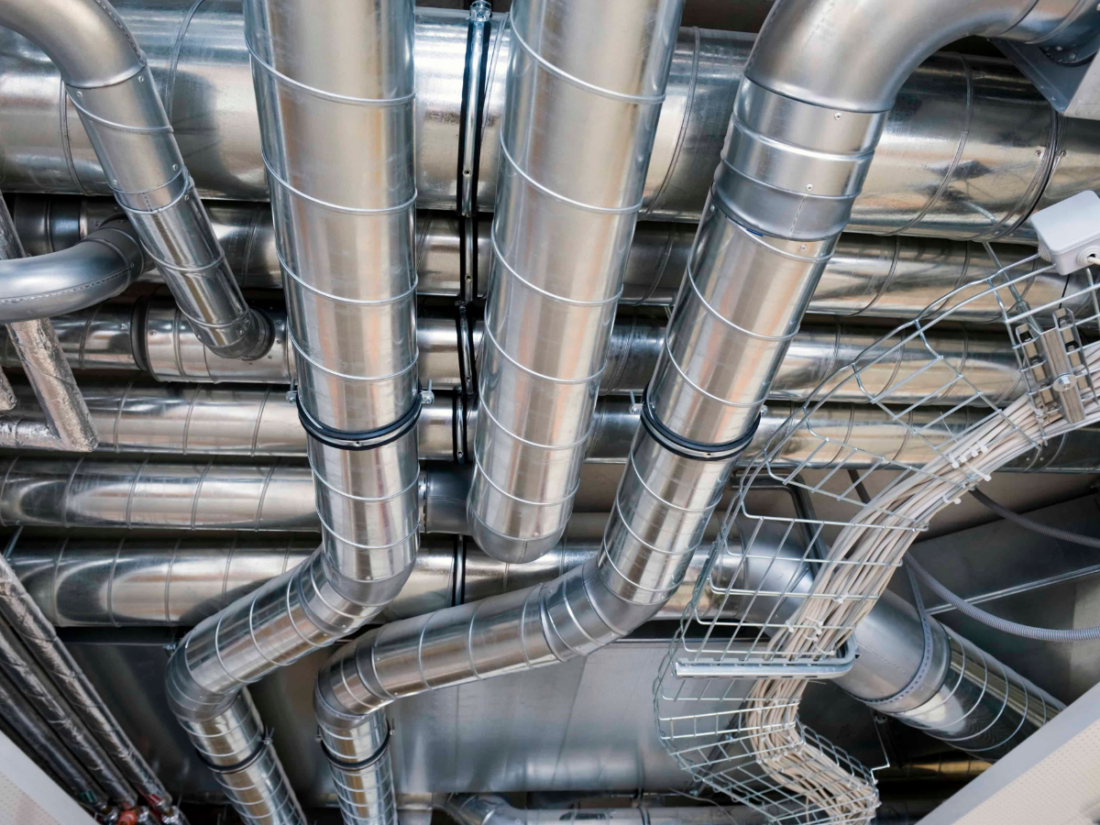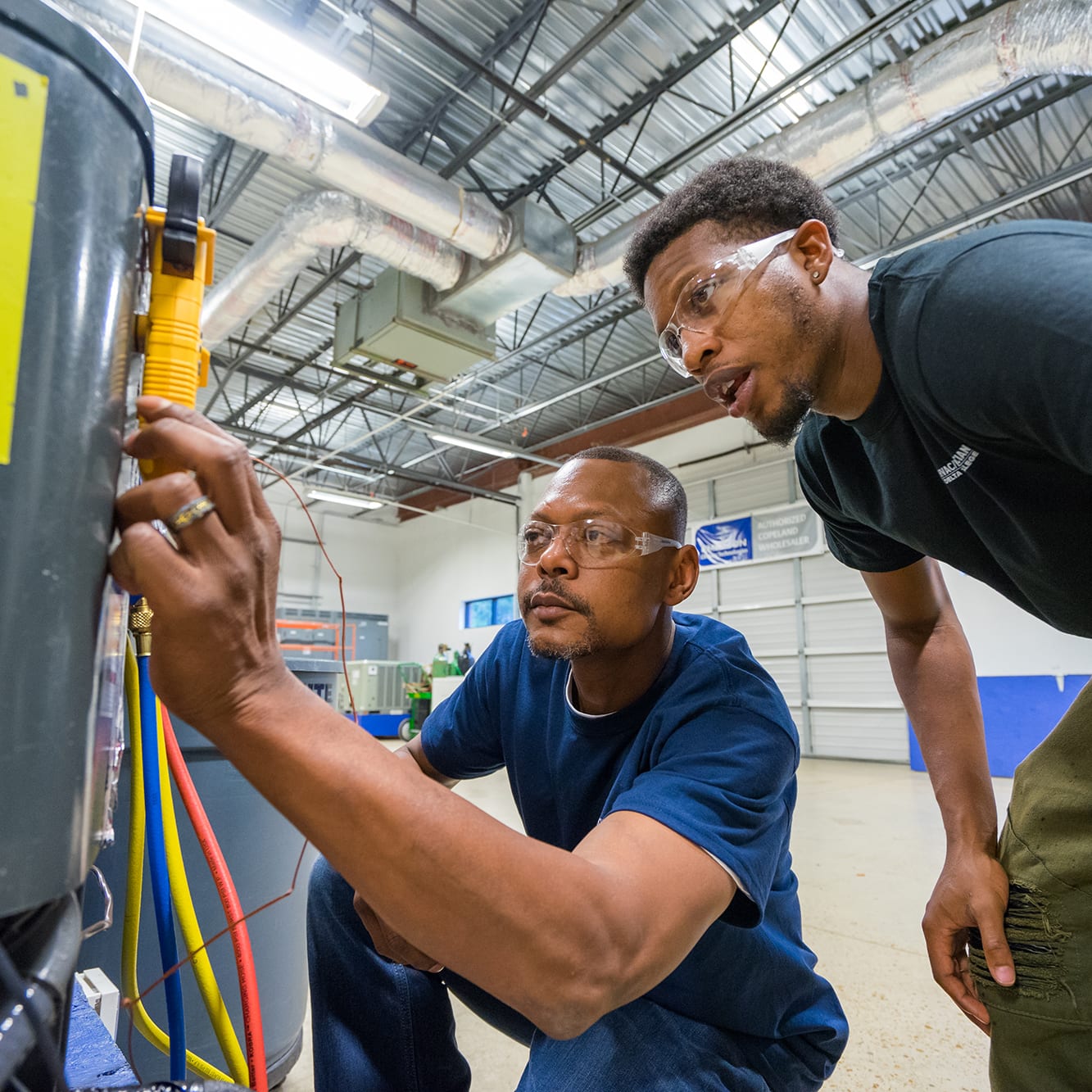Discover how HVAC experts enhance breathable air effectively
Wiki Article
Discovering the Crucial Parts of an Effective A/c System
An efficient cooling and heating system is developed on numerous crucial parts that work in consistency. Each part, from the thermostat to the ductwork, plays an important role in keeping comfort and energy performance. Recognizing these components is essential for maximizing efficiency and boosting indoor air high quality. As one checks out these components, the complex relationships in between them disclose understandings right into boosting total system performance. What particular factors add most to this efficiency?The Function of the Thermostat in Heating And Cooling Performance

Often overlooked, the thermostat plays an important duty in the performance of Cooling and heating systems. This tiny gadget serves as the key nerve center, managing temperature level settings and making certain optimal convenience within a space. By accurately picking up the ambient temperature, the thermostat connects with the air flow, home heating, and air conditioning systems to maintain the desired environment
A reliable thermostat reduces power consumption by activating the cooling and heating system just when required, therefore preventing extreme home heating or cooling. Modern programmable and wise thermostats boost this performance better by allowing individuals to establish schedules and from another location change settings, adjusting to everyday routines.
The positioning of the thermostat is essential; inappropriate area can lead to imprecise temperature level analyses, resulting in ineffective operation. Overall, a well-functioning thermostat not only boosts convenience but likewise contributes noticeably to power financial savings and the longevity of the heating and cooling system.
Recognizing the Value of Air Filters
Air filters serve an important feature in HVAC systems by guaranteeing that the air distributing within a room continues to be clean and healthy. These filters catch dirt, irritants, and other toxins, avoiding them from being recirculated throughout the environment. By capturing these fragments, air filters add to boosted indoor air high quality, which can substantially benefit occupants' wellness, particularly those with allergies or breathing problems.In addition, keeping tidy air filters improves the effectiveness of HVAC systems. Stopped up filters can restrict airflow, creating the system to work harder to maintain desired temperature levels, causing increased power usage and greater energy costs. Routinely changing or cleaning filters is a crucial maintenance step that can lengthen the life-span of HVAC equipment. Eventually, recognizing the importance of air filters permits property owners and structure supervisors to take aggressive procedures to guarantee a well-functioning, effective heating and cooling system that advertises a secure and comfy interior atmosphere.

The Performance of the Furnace and Heatpump
Furnaces and heat pumps are essential elements of heating and cooling systems, accountable for giving warmth throughout chillier months. Furnaces run by home heating air through combustion or electrical resistance, then distributing it throughout the home via ducts. They typically provide quick home heating and can be sustained by gas, electrical energy, or oil, relying on the system kind.Conversely, heatpump move heat instead of produce it. They extract warmth from the outdoors air or ground, even in low temperatures, and transfer it inside. HVAC experts. This double performance permits heatpump to likewise provide cooling in warmer months, making them functional alternatives for year-round environment control
Both systems call for proper upkeep to ensure efficiency and longevity. While heating systems master severe cold, warmth pumps can be advantageous in modest environments. Recognizing their distinct functionalities help house owners in picking one of the most suitable choice for their heating requires.
Checking Out the Air Conditioning Device
The cooling unit is a vital element of HVAC systems, available in various types to fit different requirements. Understanding the performance scores of these units is essential for making notified selections regarding power intake and expense. This section will certainly explore the diverse types of air conditioning system and clarify just how performance scores influence performance.Kinds Of Air Conditioners
While different variables affect the choice of air conditioning systems, comprehending the various kinds offered is important for home owners and structure managers alike. Central air conditioning conditioners are designed to cool entire homes or structures, using a network of air ducts for airflow. Window systems supply a more localized solution, suitable for tiny areas or single areas. Mobile a/c give versatility, permitting users to relocate the unit as required. Ductless mini-split systems are another alternative, integrating the performance of central systems with the benefit of zoning, as they require no ductwork. Lastly, geothermal systems harness the earth's temperature for energy-efficient air conditioning. Each kind comes with distinct benefits, making notified selections essential for efficient climate control.
Performance Rankings Explained
Understanding performance rankings is important for selecting the right air conditioning system, as these metrics offer insight right into the system's efficiency and power intake. One of the most usual ranking for air conditioning unit is the Seasonal Power Efficiency Proportion (SEER), which gauges the cooling output during a common cooling period separated by the complete electric power input. A higher SEER shows far better performance. Furthermore, the Energy Performance Proportion (EER) is used for gauging effectiveness under details problems. An additional crucial metric is the Energy Celebrity certification, which signifies that a system satisfies rigorous power effectiveness standards. By evaluating these scores, consumers can make enlightened choices that not just optimize comfort but also minimize power expenses and environmental influence.The Value of Ductwork and Airflow
Reliable ductwork style and air flow monitoring play important functions in the overall efficiency and performance of heating and cooling systems. Proper ductwork assurances that conditioned air is dispersed uniformly throughout a room, decreasing temperature level variations and enhancing convenience. Properly designed ducts lessen resistance to air movement, minimizing the work on HVAC devices and ultimately reducing energy usage.Air movement administration entails tactically putting vents and signs up to improve the circulation of air. This prevents common concerns such as cold or hot spots, more info which can happen when airflow is obstructed or improperly balanced. Additionally, the best duct products and insulation can further enhance efficiency by reducing heat loss or gain during air transportation.
An effective ductwork system not just adds to power cost savings yet can additionally lengthen the lifespan of heating and cooling equipment by minimizing unnecessary stress (HVAC experts). Understanding the significance of ductwork and air flow is vital for accomplishing peak HVAC system performance.
Regular Maintenance Practices to Improve Efficiency
Regular upkeep practices are crucial for ensuring peak performance of cooling and heating systems. These practices include routine examinations, cleaning, and necessary repair work to maintain the system running efficiently. Routinely altering air filters is essential, as blocked filters can obstruct air flow and minimize effectiveness. In enhancement, professionals need to examine and tidy evaporator and condenser coils to avoid overheating and power waste.Annual expert inspections are also advised, as skilled specialists can identify possible concerns prior to they rise. Lubing moving parts minimizes wear and tear, adding to a longer lifespan for the system. In addition, making certain that the thermostat works appropriately aids in keeping suitable temperature level control.

Regularly Asked Concerns
How Frequently Should I Change My Thermostat?
Thermostats ought to generally be changed every 5 to 10 years, depending upon usage and innovation developments. Routine checks are recommended to guarantee peak efficiency, specifically if experiencing irregular temperature level control or increased energy costs.What Size Air Filter Is Best for My Cooling And Heating System?
The finest size air filter for a heating and cooling system varies by system design. Commonly, it's essential to speak with the owner's guidebook or inspect the existing filter dimensions to ensure peak efficiency and air quality.Can I Mount a Heatpump Myself?
Mounting a heatpump independently is feasible for knowledgeable individuals, however it needs understanding of neighborhood codes and electrical systems. Hiring an expert is suggested to assure proper setup and suitable system efficiency.Just how Do I Know if My Ductwork Is Efficient?
To determine ductwork effectiveness, one need to examine for leakages, procedure airflow at vents, examine insulation quality, and examine temperature differences between supply and return ducts. Expert assessments can offer complete understandings into general performance.What Are Indicators My A/c Needs Immediate Maintenance?
Indicators that a heating and cooling system requires immediate upkeep include uncommon noises, inconsistent temperatures, enhanced power bills, unpleasant smells, and regular biking. Addressing these issues quickly can stop further damage and guarantee optimal system efficiency.Air filters serve an important feature in Heating and cooling systems by guaranteeing that the air distributing within a space continues to be healthy and tidy. In addition, preserving clean air filters boosts the effectiveness of A/c systems. Ductless mini-split systems are one more choice, combining the performance of central systems with the benefit of zoning, as they require no ductwork. Comprehending performance scores is vital for picking the right air conditioning unit, as these metrics provide understanding right into the system's efficiency and energy intake. The ideal size air filter for a Heating and cooling system varies by unit style.
Report this wiki page